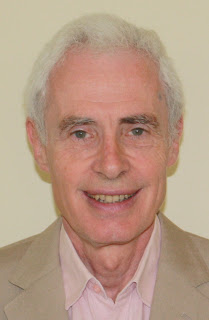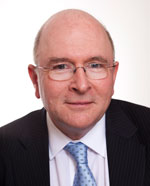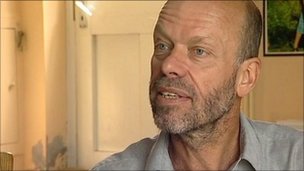Dr Peter Jefferys (top left), United Kingdom's Labour Party member, self-declared atheist, who has owed a home (converted church in Norfolk) has been a Fitness to Practice panelist since 2001 at the General Medical Council (GMC), regulator of medical profession in UK. He failed to declare all his conflicts of interests as required by GMC policy on declaration of interests. GMC has rules that panelists have to declare their interests and update them. He did not and GMC did not either for at least NINE YEARS and up to present day!
In 2002 Dr Peter Jefferys wrote to Simon Haywood, investigator at GMC stating his interest in Dr Helen Bright's case. Dr Jefferys complained to GMC that a Catholic nun was upset because Dr Bright stated that uniforms are not worn in psychiatry by mental health workers, a true fact for most of UK. At the time of his complaint UK was ruled by Labour Party with Mr Anthony Blair as Prime Minister. After leaving the government he declared himself as a Catholic.
GMC kept it secret from Dr Bright that Dr Jefferys declaration of interest in her case was late and contrary to GMC's policy for many years. GMC refused to comply with law and Dr Bright's request under section 7(1) of Data Protection Act 1998 to disclose information held on her by GMC. Quite simply, GMC misapplied section 31 of Data Protection Act to deny the information to Dr Helen Bright for years.
GMC continued to persecute Dr Bright and fix religiously biased Fitness to Practice Panels for many years. The head of empanelment was Ms Graziella Oragano (presumably from Catholic background if one can judge anything by names). She departed in April 2012 after complaints to Parliament for a couple years about the fixing of trials at GMC.
There is an interesting historical figure that of Hanging Judge Jefferys. Jefferys have been traditionally Catholic (see Hanging judge Jefferys picture bottom right, allow for age difference and whatever else is required and see the facial similarities, if any, between him and Dr Peter Jefferys). The relatives of "Hanging Judge" Jefferys were frightened of reprisals after he was imprisoned in London Tower when trying to escape. They found refuge in Catholic monasteries. Here is a bit of history:
Religion and politics were intertwined throughout James' public life. He openly opposed the Test Act of 1673, which barred all Catholics and Dissenters from holding administrative positions; James relinquished the post of Lord High Admiral and went abroad. The Whig Parliament of 1679 strove to exclude James from the succession, and failed only because Charles II dissolved Parliament. Within months of his accession, James had to crush a rebellion of Protestants who rallied around his nephew James, Duke of Monmouth and son of Charles II. The Protestants were easily defeated, and James exhibited little toleration: Monmouth was captured and beheaded. James appointed Judge Jeffries to preside over the "Bloody Assizes" which executed, tortured, or sent into slavery the Protestant rebels. James ambitiously appointed Catholics to high positions although loyal Tory councilors advised against it. As a result, both Tories and Whigs turned against him.
It is a historical fact that ladies in waiting made money from their sale of rebels into slavery.
In the time of Dr Peter Jefferys and his professional work with regulators it has been barristers who profited from injustice done to doctors, for example, by the fixing of Fitness to Practice Panels at GMC by Ms Oragano in such a manner that it was more or less guaranteed that doctor would lose. Injustice is really good for business. Dysfunctional units at their core have addiction to chaos and at least one person at GMC must have loved it. When doctors lost their Fitness to Practise cases, there would be appeals to superior courts and when doctors could no longer afford legal fees the modern day equivalent of "slavery" of bankruptcy, and low paid unprofessional work was an option if doctors stayed alive.
GMC grew millions (no need to pay tax as a charity) because of the Labour Party agreement to allow GMC to register as a charity (charities do not pay tax). This happened despite the High Court and Court of Appeal ruling to the contrary that GMC could not be a charity. Thus, money was made available to GMC to persecute doctors, dissidents of government policies which were breaking the EU law, for example, in return to the government for this favor of not paying the tax. It is not clear how many people died because of political persecutions but on the balance of probabilities many did. When competent doctors are eliminated and there is shortage of doctors, patients die, on the balance of probabilities. This is what happened after Dr Jefferys dimissed Dr Helen Bright from Northwick Park Hospital and he had no replacement for her. A couple of patients committed suicides. GMC covered up nicely for him since 2003 when they heard about it for the first time. Hospital is liable for such deaths when patients are under their care. It was in Dr Jefferys, personal interest to have Dr Bright's reputation smeared by allegations of bad behavior rather than any allegations that she harmed any patients. Dr Bright has never been found to be danger to any patients or public by any regulator. It was a brilliant and cunning plot by Dr Jefferys which GMC was keen to embrace because GMC themselves never managed to completely separate the politics and religion from their own interests. Patients and public interest are of course, completely irrelevant when it comes to real life, and power games as many doctors have learned by now.
GMC have never considered what impact it has on witnesses, for example, appearing before GMC FTP to know or not to know, as the case may be, that Dr Peter Jefferys sat on their regulatory bodies. At the last count Dr Peter Jefferys sat at regulatory bodies regulating at least eighteen different professions. There would have been so much opportunity for the vindictive side of his character to be put to use.
How would barristers feel making submissions at GMC and in superior courts knowing that Dr Jefferys worked and has connections with their regulatory body? Would the interests of their clients really come first?
If they did not know, but their clients interests suffered anyway, as they would in the hands of unaccountable regulator's FTP panel fixer, where is justice?
Dr Peter Jefferys has worked as non-executive director of Norfolk and Waveney Mental Health Trust and now Norfolk and Suffolk NHS Foundation Trust. AGAIN THERE IS NO DECLARATION THAT HE WAS A MEMBER OF PROFESSIONAL CONDUCT AND COMPLAINTS COMMITTEE OF BAR COUNCIL.This time his declared interests are:
Peter Jefferys joined the trust in September 2011, leaving London after 30 years as a consultant in the psychiatry of old age at Northwick Park Hospital, in Harrow, to live permanently in Norfolk. He has experience as medical director of a community and mental health trust, and has been involved in professional regulation with the General Medical Council, the Health Professionals Council, and the General Social Care Council. He has also been involved in a wide range of associated clinical practice as a second opinion appointed doctor for the Care Quality Commission, and as clinical adviser to the Parliamentary and Health Services Ombudsman.
Dr Jefferys has reasons why he does not declare that he was a member of Professional Conduct and Complaints Committee of Bar Council just for one year. Normally, appointment is for several years. Barristers would be interested to know why he was there just for one year. Appointment at Professional Conduct and Complaints Committee of Bar Council would have been a useful to him in his case against his instructing solicitor Yvonne Hossack when he was her expert witness and complained about her to Law Society, after she complained about him first to GMC, for example.
Dr Peter Jefferys also worked as advisor to the Parliamentary and Health Services Ombudsman, yet another interest not to be found on GMC website today. Patients and relatives complain against doctors and to Parliamentary and Health Services Ombudsman as well as to GMC. Would the complainants know who assessed the validity of their complaints in different institutions?
No conflicts of interests, of course, not. it is not just that conflicts have to be declared but they have to be assessed. Willful blindness all around.
Remarkably, on oath when giving evidence against solicitor Yvonne Hossack at Solicitors Disciplinary Tribunal, Dr Peter Jefferys claimed that GMC have to have consent of patients for their identities to be disclosed to them. Since when did GMC get the consent of patients in Dr Harold Shipman's case? Or in the cases of those who are unable to give their consent because of fear or severity of dementia or where it would be unreasonable to seek their consent?
Dr Jefferys has regarded himself as the expert on mental capacity and has worked at GMC. However, none of these credentials are necessary to know some basic facts: GMC needs to have the names of patients in order to investigate the complaints properly should they feel the need to do so.
In 2002 Dr Peter Jefferys wrote to Simon Haywood, investigator at GMC stating his interest in Dr Helen Bright's case. Dr Jefferys complained to GMC that a Catholic nun was upset because Dr Bright stated that uniforms are not worn in psychiatry by mental health workers, a true fact for most of UK. At the time of his complaint UK was ruled by Labour Party with Mr Anthony Blair as Prime Minister. After leaving the government he declared himself as a Catholic.
GMC kept it secret from Dr Bright that Dr Jefferys declaration of interest in her case was late and contrary to GMC's policy for many years. GMC refused to comply with law and Dr Bright's request under section 7(1) of Data Protection Act 1998 to disclose information held on her by GMC. Quite simply, GMC misapplied section 31 of Data Protection Act to deny the information to Dr Helen Bright for years.
GMC continued to persecute Dr Bright and fix religiously biased Fitness to Practice Panels for many years. The head of empanelment was Ms Graziella Oragano (presumably from Catholic background if one can judge anything by names). She departed in April 2012 after complaints to Parliament for a couple years about the fixing of trials at GMC.
There is an interesting historical figure that of Hanging Judge Jefferys. Jefferys have been traditionally Catholic (see Hanging judge Jefferys picture bottom right, allow for age difference and whatever else is required and see the facial similarities, if any, between him and Dr Peter Jefferys). The relatives of "Hanging Judge" Jefferys were frightened of reprisals after he was imprisoned in London Tower when trying to escape. They found refuge in Catholic monasteries. Here is a bit of history:
Religion and politics were intertwined throughout James' public life. He openly opposed the Test Act of 1673, which barred all Catholics and Dissenters from holding administrative positions; James relinquished the post of Lord High Admiral and went abroad. The Whig Parliament of 1679 strove to exclude James from the succession, and failed only because Charles II dissolved Parliament. Within months of his accession, James had to crush a rebellion of Protestants who rallied around his nephew James, Duke of Monmouth and son of Charles II. The Protestants were easily defeated, and James exhibited little toleration: Monmouth was captured and beheaded. James appointed Judge Jeffries to preside over the "Bloody Assizes" which executed, tortured, or sent into slavery the Protestant rebels. James ambitiously appointed Catholics to high positions although loyal Tory councilors advised against it. As a result, both Tories and Whigs turned against him.
It is a historical fact that ladies in waiting made money from their sale of rebels into slavery.
In the time of Dr Peter Jefferys and his professional work with regulators it has been barristers who profited from injustice done to doctors, for example, by the fixing of Fitness to Practice Panels at GMC by Ms Oragano in such a manner that it was more or less guaranteed that doctor would lose. Injustice is really good for business. Dysfunctional units at their core have addiction to chaos and at least one person at GMC must have loved it. When doctors lost their Fitness to Practise cases, there would be appeals to superior courts and when doctors could no longer afford legal fees the modern day equivalent of "slavery" of bankruptcy, and low paid unprofessional work was an option if doctors stayed alive.
GMC grew millions (no need to pay tax as a charity) because of the Labour Party agreement to allow GMC to register as a charity (charities do not pay tax). This happened despite the High Court and Court of Appeal ruling to the contrary that GMC could not be a charity. Thus, money was made available to GMC to persecute doctors, dissidents of government policies which were breaking the EU law, for example, in return to the government for this favor of not paying the tax. It is not clear how many people died because of political persecutions but on the balance of probabilities many did. When competent doctors are eliminated and there is shortage of doctors, patients die, on the balance of probabilities. This is what happened after Dr Jefferys dimissed Dr Helen Bright from Northwick Park Hospital and he had no replacement for her. A couple of patients committed suicides. GMC covered up nicely for him since 2003 when they heard about it for the first time. Hospital is liable for such deaths when patients are under their care. It was in Dr Jefferys, personal interest to have Dr Bright's reputation smeared by allegations of bad behavior rather than any allegations that she harmed any patients. Dr Bright has never been found to be danger to any patients or public by any regulator. It was a brilliant and cunning plot by Dr Jefferys which GMC was keen to embrace because GMC themselves never managed to completely separate the politics and religion from their own interests. Patients and public interest are of course, completely irrelevant when it comes to real life, and power games as many doctors have learned by now.
GMC have never considered what impact it has on witnesses, for example, appearing before GMC FTP to know or not to know, as the case may be, that Dr Peter Jefferys sat on their regulatory bodies. At the last count Dr Peter Jefferys sat at regulatory bodies regulating at least eighteen different professions. There would have been so much opportunity for the vindictive side of his character to be put to use.
How would barristers feel making submissions at GMC and in superior courts knowing that Dr Jefferys worked and has connections with their regulatory body? Would the interests of their clients really come first?
If they did not know, but their clients interests suffered anyway, as they would in the hands of unaccountable regulator's FTP panel fixer, where is justice?
Dr Peter Jefferys has worked as non-executive director of Norfolk and Waveney Mental Health Trust and now Norfolk and Suffolk NHS Foundation Trust. AGAIN THERE IS NO DECLARATION THAT HE WAS A MEMBER OF PROFESSIONAL CONDUCT AND COMPLAINTS COMMITTEE OF BAR COUNCIL.This time his declared interests are:
Peter Jefferys joined the trust in September 2011, leaving London after 30 years as a consultant in the psychiatry of old age at Northwick Park Hospital, in Harrow, to live permanently in Norfolk. He has experience as medical director of a community and mental health trust, and has been involved in professional regulation with the General Medical Council, the Health Professionals Council, and the General Social Care Council. He has also been involved in a wide range of associated clinical practice as a second opinion appointed doctor for the Care Quality Commission, and as clinical adviser to the Parliamentary and Health Services Ombudsman.
Dr Jefferys has reasons why he does not declare that he was a member of Professional Conduct and Complaints Committee of Bar Council just for one year. Normally, appointment is for several years. Barristers would be interested to know why he was there just for one year. Appointment at Professional Conduct and Complaints Committee of Bar Council would have been a useful to him in his case against his instructing solicitor Yvonne Hossack when he was her expert witness and complained about her to Law Society, after she complained about him first to GMC, for example.
Dr Peter Jefferys also worked as advisor to the Parliamentary and Health Services Ombudsman, yet another interest not to be found on GMC website today. Patients and relatives complain against doctors and to Parliamentary and Health Services Ombudsman as well as to GMC. Would the complainants know who assessed the validity of their complaints in different institutions?
No conflicts of interests, of course, not. it is not just that conflicts have to be declared but they have to be assessed. Willful blindness all around.
Remarkably, on oath when giving evidence against solicitor Yvonne Hossack at Solicitors Disciplinary Tribunal, Dr Peter Jefferys claimed that GMC have to have consent of patients for their identities to be disclosed to them. Since when did GMC get the consent of patients in Dr Harold Shipman's case? Or in the cases of those who are unable to give their consent because of fear or severity of dementia or where it would be unreasonable to seek their consent?
Dr Jefferys has regarded himself as the expert on mental capacity and has worked at GMC. However, none of these credentials are necessary to know some basic facts: GMC needs to have the names of patients in order to investigate the complaints properly should they feel the need to do so.





 Dr Richard Alexander Scott, ex Christian missionary, and a General Medical Practitioner allegedly asked one of his patients if he had considered faith in Jesus during his consultation in National Health Service surgery. Patient was allegedly distressed by this and his mother wrote a complaint to General Medical Council, the regulator of medical profession.
Dr Richard Alexander Scott, ex Christian missionary, and a General Medical Practitioner allegedly asked one of his patients if he had considered faith in Jesus during his consultation in National Health Service surgery. Patient was allegedly distressed by this and his mother wrote a complaint to General Medical Council, the regulator of medical profession.